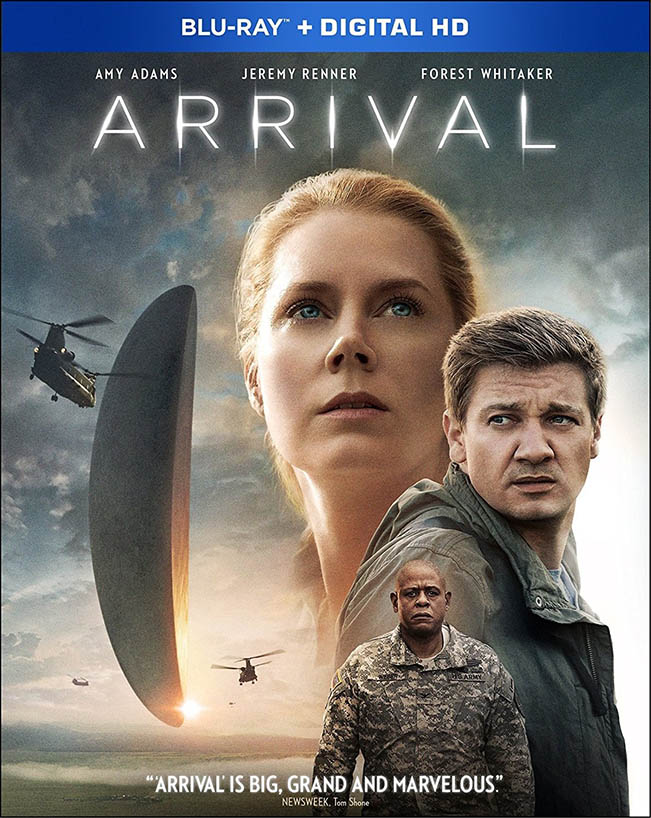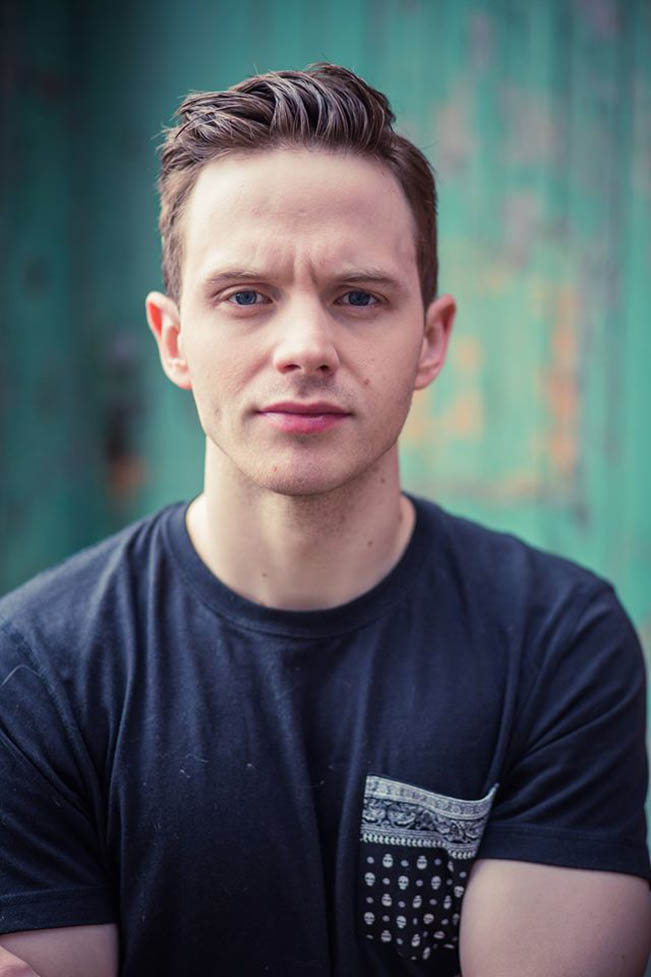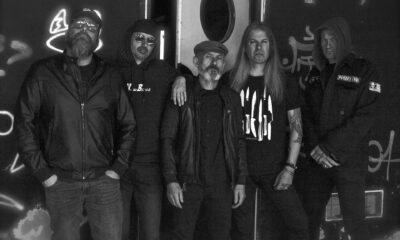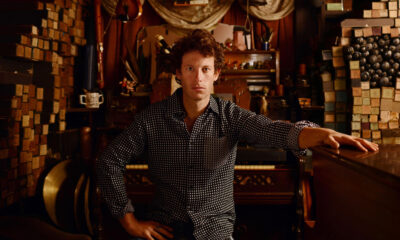Interviews
Mark O’Brien Interview; Canadian-Born Actor Discusses His Role in New Paramount Pictures Movie ‘Arrival’
Arrival is truly one of the finest films of 2016, and PureGrainAudio was able to field twenty minutes worth of questions at Mark O’Brien, a Canadian-born actor with a significant role in the movie.

With so many of this year’s Oscar nominated films focused on human dramas, it is no surprise that director Denis Villeneuve’s Arrival is nestled in amongst these nominated films – it being a very human film that happens to fall under a blanket of science fiction. Starring Amy Adams, Jeremy Renner, and Forest Whitaker, Arrival tells the tale of an emotionally wounded linguist recruited by the military to help communicate with an alien race when a dozen large space ships appear simultaneously around the world. Arrival is truly one of the finest films of 2016, and PureGrainAudio was able to field twenty minutes worth of questions at Mark O’Brien, a Canadian-born actor with a significant role in the movie. We talked by phone on February 8th. Arrival was released this past week on 4K Ultra HD, Blu-ray, and DVD, the Blu-ray presentation containing over 80 minutes of insightful interviews and featurettes.
Are you still located out on the east coast? Or have you made a move to L.A.?
O’Brien: I live in L.A. now, yeah. I’ve been down there for three years.
I figured as much.
O’Brien: Yeah. We all end up there. All roads lead there.
Can you tell me what your first day was like on the set of Arrival, Mark?
O’Brien: Great question. My first day, I didn’t know what to expect. I’d done a bit of work in special effects before, a bit of CG stuff, but nothing to this level. So I had no idea how practical it was going to be or anything like that. We shot a couple of scenes that day. We shot the scene where we are strapping up to go into the pod for the first time.
OK.
O’Brien: So I was standing right next to Amy (Adams) and right across from Jeremy Renner which was, for me, a pretty surreal thing.
Oh yeah!
O’Brien: I remember seeing Amy in Junebug, and I can remember telling all of my friends, “You’ve got to see this actor in the movie called Junebug.” And a lot of my friends had texted me when I got this role saying that I’d steered them onto Junebug, and Amy, a decade ago, and now I was working with her. So I was excited. Excited to be a part of it. I’m such a massive fan of Denis Villeneuve. Even more so now. It was just such a treat, man.
First day? That was when you do that leap into the pod and do that vertical gravity thing?
O’Brien: No, we actually shot that whole sequence over a week. The first day was just us strapping in and Jeremy was asking “what do they look like.” And I got to say “You’ll see when we get in there.” And he just did a one-er, Denis did it in a one-er. And I can remember feeling how efficient the set was. In the sense that this was a big movie and Denis shoots very economically. It wasn’t this big long kind of a thing, it was a quiet set and not a massive crew. It was pretty different than what I had expected. I was surprised.
I like that you used the word efficiency. Watching the movie a second time, I found myself analyzing it a little differently. It felt to me like a very efficient set film. Very contained. You could almost do this movie on a stage as a play. So much of it being filmed in tents. Tents that could really be anywhere.
O’Brien: Yes. It was. It was almost like a smaller film in the way that it was shot. Denis is like this: I’ve never met anyone in my whole life who seems unable to make a wrong decision. Something that I could disagree with. The funny thing is some of his decisions, it took me six months to realize how brilliant they were. So that comes down to even the size of his crew and the size of his set. I assume all of that was intentional to make this thing a bit easier to make. I think some of these effects films might be overwhelming sometimes. I’ve never been on a 200 million dollar film set. But I have been on sets where there have been two to three hundred people there. And I know that can be quite overwhelming. So I think it simplifies things. Sometimes you only need one person to do the job – you don’t need ten.

I know that you dabble in film direction as well. This was a win for you, right? You got to watch Villeneuve work and learn from him while you were there acting.
O’Brien: Oh yeah. It was a dream come true. You know what’s funny? I’ll tell you what I learned watching Denis. To have a good story. If you have a good story. And you are confident in that story, then that’s all you have to do. It requires a lot of talent underneath that, of course, which is what Denis has. But if you have that talent… and everyone has different levels of talent. And different levels of skill and different levels of communication with other people. Different levels of passion. But if you have those things at all, and you have a good story, you can just make your movie with confidence.
Now it might not be as good as one of Denis Villeneuve’s films because he’s a master. He’s a genius. But, so many people want to be filmmakers, to them I’d say make your story good and believe in your story. And that can be subjective. You must think your story is good. You think that it works and you understand it. And you know it inside and out. So you cannot go wrong. Even talent, it can be hard to be objective about that. Because it’s all based on opinion. I just watched someone who is really confident at what they do. For me, that all just comes back to loving what you do. Denis clearly loves what he does. And it comes through. And he’s a good guy. Beneath it all, he’s this wonderful guy. Which I think makes him even more talented because he’s able to communicate so well.
Denis keeps hitting it out of the park. His past three or four films have been some of my favourite moments sitting in a dark theatre over the past decade. I’m really eager to see what he’s going to continue on with over the next decade.
O’Brien: I honestly can’t imagine him not hitting it out of the park. It’s a really extraordinary thing to witness. He’s a very extraordinary director. I can’t imagine him not delivering. And also, I should mention this here, being on the set and watching him with the producers on set… the way people trust him is unlike anything I’ve ever seen. The way Jeremy and Amy and Forest trusted him. The way Aaron Ryder and Dan Levine trusted him – and Dan Cohen and Shawn Levy – everyone just trusted him completely. It’s a testament to them and their trust, and it’s also a testament to Denis and his confidence – the trust that is there.
There’s a neat quote floating around online from Jeremy Renner – I guess after he’d seen the film he admitted that he wasn’t sure how it was going to look and he was talking about how blown away he was by it.
O’Brien: Oh yeah. Totally. I had no idea how it was going to look either. Denis would show us some of the raw footage before any of the special effects were done. Which gave us an idea. But I still didn’t really know. He shoots so economically there were times we’d finish a scene and I’d be surprised it was done so quickly. But he got it. He knows what he got, and he doesn’t need to shoot forever. That’s a sign to me of someone who really knows what they are doing. His ability to say “we got it. I don’t need anything more on this scene.”
Nice. That scene that I mentioned earlier, where you leap up into the ship and do the 90-degree vertical gravity thing – was that shot using wires? It was pretty smooth.
O’Brien: Actually no. We shot that – it was actually kind of complicated. The pod that we go in was practical. That set was practical. The way that he shot it was that we were never vertical in any kind of way. It was always completely horizontal so it was just the camera angle. And some CG that made it look like that. And the actual rising into the shell on the lift we shot bits and pieces of that over a week to a week and a half. That took a long time to get. That was some of the biggest CG stuff in the film, that stuff. Getting into the actual pod. You had to really establish it in the film. It’s a slow build. And then after that, you can just cut to us in there, because you already know. You understand what it entails. So that was some of the most complicated CG kind of stuff. But Denis made it all very simple for us.
One of the scenes I really enjoyed watching you do was about 50 minutes into the film, the dialog you have with your wife on the phone. You are talking to her at home. And she is upset. And you are reassuring her, but your face shows the viewer that you aren’t reassured yourself. Your character is questioning what’s going on. It was an enjoyable scene to watch.
O’Brien: Oh thanks. It’s funny, we actually shot that a little after the film. Which I thought was a really good choice from Denis. We kind of just did this phone call where I didn’t have an actor on the other end. So we did it a number of ways. What was really cool was that Denis just let me kind of improvise it. He suggested a few ways to try it and we shot it a number of ways. And then we eventually kind of settled on that; That it should be a kind of a still moment. I always felt that that character was uncertain. I was trying to think of something interesting to do with that character. It could have easily just faded into the background. But we find out that he has something at stake.
What’s interesting is that he’s a guy in the military but at the same time he has concerns. There’s a concern here under all of this. Which I had to make very subtle because it’s not his story. It’s Louise Banks’ story. So it was never going to be overblown or anything like that. But it needed to be there. He’s still a person. He’s not just some background guy. I really wanted to make it so that he had something going on. He had a fear. The reason why the fear or some sort of apprehension is good, is he’s a military guy. He’s a very black and white personality. There are no outside variables that would change anything for him. So if and when that happens, what might that do to a person?
There were a few outside variables in that you are all watching the newsfeeds onsite at the camp, and watching the global paranoia and skepticism build. That was a fun plot point to watch unfold.
O’Brien: And that is so prevalent everywhere, right? We get fed these ideas daily and then get freaked out by them all the time.
Check out the official trailer for Arrival
This was really the first movie that I think I’ve noticed you in Mark. How were you cast in Arrival?
O’Brien: Well I’ve done a lot of television. I did a show in Canada for six years called Republic of Doyle and I do a show on AMC called Halt and Catch Fire. I’d been working on those for a little while and I’d bet that Halt and Catch Fire maybe helped me get seen a little bit more. AMC is a pretty respected network. I just wound up getting an audition for it. They wanted to see me for it. I sent a tape and tried to do my own thing on it. Like I said, I was trying to not be a typical military guy. I sent the tape in and then Denis wanted to chat with me over Skype. So we chatted and then I was off to shoot. It was kind of quick and pretty simple, really.
That’s awesome to hear. Can you talk a little about your journey into film? What you were like as a teenager and what steered you towards a career in acting?
O’Brien: Oh man. I grew up, me and my buddies making films together in Newfoundland. We didn’t have very much money, and I remember a friend of mine, his parents had a really cool camera. So we’d make these movies with the camera and then we would edit them using two VCRs. (laughs) There was no computer editing software then. If there was, we couldn’t access it. This was 1999 or whatever. We made about 50 of those, you know? Some were an hour long. And we’d edit music in. We’d edit in the music – there was no way for us to do it with a computer. So we would play the actual edited version on a VHS tape on a TV and then we would film the TV using a camcorder. And then have a CD player going as a background. So that way we could have music over our cuts as we filmed the TV itself. Then we would take that tape and put that onto a VHS.
I was obsessed with it. And then I went to university and I got an English degree and while I was doing that I was doing improv and then started working on a kids show that I did out of Newfoundland and Toronto. And then I did Republic of Doyle. And then I just did more and more. But I was always obsessed with film. I always wanted to be a part of film in some sort of way. I just never stopped. I just took every opportunity that came my way and a lot of it was non-paying, or minimal money. Some of it ended up going nowhere, you know? The amount of scripts that never get made in Hollywood is astounding.
We had talked a bit about Denis and how you got to watch him work, and learn from him a bit while you were working on this film. Do you think there is any one thing that you learned that you might apply to your next film project, Mark?
O’Brien: Yeah. I think it’s being confident in what you have to do and not letting other things get in the way. Other things will come up. Suggestions. Changes. Notes. Things like that. As long as those notes and suggestions all go towards the main goal of the film you are making, you consider them. And sometimes that gets lost. Sometimes you can go too far down the rabbit hole of suggestions on how your movie should be and commentary on films that just come out while filming is in progress. And you can get lost. Or you don’t move at all and can miss out on good ideas because you are fixed on the version of the film on paper in front of you. But if you actually know your story you are open to changes and possibly changing it as you go. And you are also carrying the confidence to know when to stop and assess and keep the film on its path. That, and to make things lean. Really lean. Denis is really good at that. You look at all of his movies and in the first ten minutes, we are sucked in. That’s what I learned, really. To have that clarity and get to the point while directing.
Where were the exteriors for this film shot Mark. I didn’t really glean that anywhere in my prep for this interview, and they do look somewhat Canadian.
O’Brien: It was shot in Montreal. And a little in Rimouski.
Cool. Aside from the obvious answer here, did you notice anything different when you were shooting exteriors on this film compared to the interiors? Style of direction? Any ability to move around a bit more?
O’Brien: Nope. Not really. It was different than being in the Pod, of course. What’s great about Denis if his film feels like a standard shoot, but it’s done right. The feeling is just that it feels right. It’s the way a film should go. It never felt weird or anything like that. The feeling I got while there was that things made sense. You realize how simple it can all be when you work with a team like that. This process can be very simple. So, let’s just got with that. It’s funny, that simplicity is actually very invigorating.

I’m sure there are productions out there that feel daunting and unorganized. That’s across the board in any field really. There’s a smooth way to do things and a not so smooth way.
O’Brien: Yes. That mass confusion can totally happen. It’s kind of the nature of the business in a way. Because there’s a lot of different people all handling different levels of stress in film. A lot of voices, and a lot of cooks in the kitchen. Sometimes that just goes down. On this film, it didn’t. And I think that is attributed to the producers and their trust in their director.
Right on. Both times I’ve watched this film I’ve wound up crying. It’s a very emotional film on a number of levels, right?
O’Brien: Yeah.
It’s my personal favourite from last year. And I’ve seen some of the other films getting Oscar buzz, but none of them really affected me in the way that this film did. I’m really glad that it got made. I imagine it was a hard pitch.
O’Brien: Yeah, it’s a very human movie. It’s a real story. And I think that when you are doing something that is a big as Arrival, a film with an alien race coming down to our planet, the only way that you could relate to it is to make a story that is human. Something that we can emotionally connect to. Like the loss of a child or family member. I think that once you put that in, a thing that we can all relate to, now you have inroads into this big thing in the movie because we’ve latched onto this first thing. Which was human and relatable. Now we are in for the ride. And think that’s how it was able to be so emotional. Some other sci-fi movies are so far out of this world, that it gets hard to connect to them on an emotional level. You are just there for the fun of it. Which is fine. But it’s nice to be able to have that emotional connection. Like I said, in the first ten minutes, we are emotionally hooked.
This is going to date me. I went to see Close Encounters with my dad when I was younger….
O’Brien: Oh cool.
This film reminded of Close Encounters because it’s a film about trying to communicate with an alien race. Spielberg did it through music. I liked that Arrival focused on linguistics and the understanding of the alien fonts and typography. That struck me as a really cool concept for the story.
O’Brien: yeah. It’s really different. That’s from Ted Chiang’s short story Story of Your Life. And from Eric Heisserer’s script. I got to talk to Eric a couple of times about this. I’m so happy he got an Academy Award nomination for this movie. He worked on this for years. He and 21 Laps Entertainment, the production company, they worked on this for years trying to get it made. It’s a marvel that it finally did get made. It’s such an interesting story. But it was a hard sell, I guess. A linguistics movie? It’s not something we’re used to. But I do think audiences are generally attracted to larger scale things. Large scale ideas. And good films.
You look at the Oscar films every year by year, they all have good box office numbers. They all do because we are starved for them. We want stories like that. We want stories like Arrival. And they CAN be made. It just takes the people who are willing to do it. That is why I think so much has been said about Denis. I can’t say enough good things about him. But also the same for the producers involved in this film as well. People really taking a chance and really trying to make something that is worthwhile and different and strong and carries a different voice. You really don’t see that very often.
I am going to assume that because you’re both an actor and a director that you have also taken a stab at writing. How do you approach your screenplays?
O’Brien: It’s funny, I’ve written about six scripts in the past two years. Several of them are at different levels of development. And I have to say I kind of like that grounded sci-fi theme. The idea of sci-fi that isn’t really sci-fi. Almost like a Stanley Kubrick style of thing. That kind of vibe and feel. Or Jonathan Glazer. The way I look at it is that I always like a movie to catch me in the first ten minutes. Five minutes even. You look at the work of Martin Scorsese’s movies, we know the film that we are going to watch, and have a general vibe of what’s going on within the first ten minutes. All of the best filmmakers do that. All of MY favourite filmmakers I should say, because everyone has different opinions.
That is what I try and write. I try and write something that shows the stakes are as high as they can be and we have locked in right away and it’s a world we can picture. I think when you are reading a script that you should be picturing something. I know that sounds kind of silly, but I read a bunch of scripts where I have no visual in my head. And that’s a problem. I try and communicate things lean as well. I was saying to someone earlier that Picasso said that art is the removal of the unnecessary. Stephen King said that your first draft is your first draft, and your second draft is your first draft minus ten percent. So the paring it down process – how do you communicate JUST the story.
So the most common problem I see with most scripts from my point of view is that the story tries to say other things, and it gets muddled and lost. It became confusing because the writer is trying to say ten things at once. When it’s possible for you to just say something really clearly and really directly. David Mamet is great for that too. He is one of these great writers who just gets to the point really quickly. That is what I look for when I’m writing. To understand how I get into this so that people want to keep turning the page. SO they feel they NEED to know what is going to happen. And when it happens they will be surprised, but it will make sense to them.
Your next film is also sci-fi, correct? It’s the guy that did Gattaca, another great film.
O’Brien: Yeah, Andrew Niccol. Actually, there are two other sci-fi films after that. (laughs)
Excellent. I loves me some sci-fi.
O’Brien: I’m writing sci-fi, I’m in sci-fi. So yes, Anon is the Andrew Niccol film. It’s such a cool premise. I don’t know how much I can say about it because I know it will come out sometime this year. It’s got Clive Owen and Amanda Seyfried. It’s going to be really something. I’m a huge Andrew Niccol fan as well. The Truman Show and Gattaca and Lord of War. There’s a totally underrated film! Then I did another film called Kin with the producers of Arrival, actually. It’s a Lionsgate feature. That’s also a very interesting concept. And then I just finished one on Vancouver called Parallel which is a Bron Studios production. Bron just did Fences and The Birth of a Nation.
Right on.
O’Brien: Yeah, it’s a really cool movie about four young tech entrepreneurs who find a portal into a parallel universe. But very practically done. And really interesting. It’s kind of similar to Arrival in that it’s not really about the sci-fi concept, it’s about something else. It’s about ambition. We’re really stoked about that film.
Right on. It’s exciting to hear that you are fitting into all of these cool opportunities. Being a sci-fi nut, it’s cool to hear that you are doing so much science fiction. It’s a genre I truly do love.
O’Brien: Thanks, man. It’s cool. I just love it. I could do it all day, every day.
-

 Music6 days ago
Music6 days agoTake That (w/ Olly Murs) Kick Off Four-Night Leeds Stint with Hit-Laden Spectacular [Photos]
-

 Alternative/Rock7 days ago
Alternative/Rock7 days agoThe V13 Fix #010 w/ High on Fire, NOFX, My Dying Bride and more
-

 Alternative/Rock2 weeks ago
Alternative/Rock2 weeks agoA Rejuvenated Dream State are ‘Still Dreaming’ as They Bounce Into Manchester YES [Photos]
-

 Features6 days ago
Features6 days agoTour Diary: Gen & The Degenerates Party Their Way Across America
-

 Culture1 week ago
Culture1 week agoDan Carter & George Miller Chat Foodinati Live, Heavy Metal Charities and Pre-Gig Meals
-

 Music1 week ago
Music1 week agoReclusive Producer Stumbleine Premieres Beat-Driven New Single “Cinderhaze”
-

 Alternative/Rock1 week ago
Alternative/Rock1 week agoThree Lefts and a Right Premiere Their Guitar-Driven Single “Lovulator”
-

 Alternative/Rock2 weeks ago
Alternative/Rock2 weeks agoDeath Wishlist Are Fiery and Fierce with Their “I Get Bored” Video Premiere













